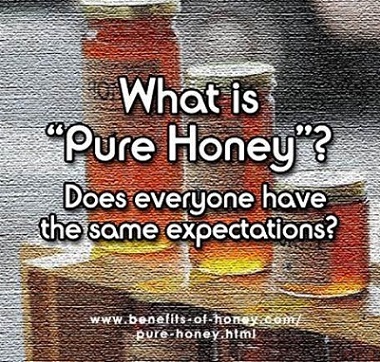
What is Pure Honey? (1-Question Survey)
You might have noticed that suppliers of commercial jars of honey on the supermarket shelves love to label their products as "pure honey".
We also have people asking,
"Where can I get pure honey?"
"How do you know if this is pure honey?"
My question is, so what is "pure honey" actually? What do you expect of pure honey?
What got me even more curious about this honey term was this frequently asked question,
"Which is better, raw honey or pure honey?"
My first responses were:
"Why compare pure honey with raw honey?"
"Can't honey be pure and raw at the same time?"
I suspect the term "pure honey" has to do with how honey jars are commercially labeled today. So I did a little research by going around asking people I know to tell me spontaneously what they understand by "pure honey" and also started a conversation on Facebook asking the same question. Participants were advised not to judge and comment on what was right or wrong, so that nobody was influenced anybody and we could get as many spontaneous responses as possible.

Before we reveal our findings to you, you may want to ask yourself the same question first and then compare with what we have discovered.
Here we go. We found four major groups of meanings and associations of "pure honey".
1. Raw Honey
* Honey straight from the hives.
* Unpasteurized, unheated, unprocessed.
* Lightly strained honey, simply filtered only to remove capping and wax particles.
So how does this definition gel with what we see about commercial pasteurized honey that are marketed and labeled as pure honey? Most commercial honey is not raw!
2. Organic Honey
* Honey produced by bees fed with organically grown flowers in fields.
* Free of pesticides and chemicals.
Well, this is definitely not true for the many commercial honey jars that do not carry any organic certification. Organic claims of commercial products including honey require legal certifications by organic farming or food associations.
3. No Added Flavors
* Just honey, no additives, nothing else added.
* Unadulterated, no blending with other sweeteners or thinning with corn syrup or sugar.
This is the definition that I have been assuming all this time for "pure honey". Thus, my understanding is pure honey can be raw or pasteurized, and it is hard to say which (pure honey or raw honey) is better because in this case we are comparing apples and oranges. The most ideal is of course pure and raw honey. But supermarket honey is tricky. Would merchants play with words and be so blatant as to claim "pure honey" on the jar with only some presence of pure honey and have the rest of the honey diluted with other sweeteners? The unscrupulous merchants would, I suppose.
4. Clean Honey
* Filtered, free of all impurities.
This seems to be the closest to the literal meaning of pure honey. Surely, this isn't a good thing if it means crystal clear, micro-filtered, pollen free honey. Perhaps I am too biased against commercial honey, but I suspect this definition fits the description of most supermarket honey which is pasteurized, micro-filtered, super clean and entirely free of pollen.
Conclusion
Apparently, not every response could be categorized neatly into one group, for instance, some believe that pure honey is both raw and organic, and some believe that it is clean and no additives added. Overall, results of the survey show that the term "pure honey" has gone beyond the boundaries of its literal meanings. How one interprets "pure honey" depends very much on one's experience with honey and the type of honey they consume. For instance, if you keep your own bees, you probably would expect pure honey to be raw, straight from the hives, or would even say pure honey is organic because you know exactly where you bees forage for nectar. However, if you only eat mostly honey purchased from the supermarket, it's very likely you would say pure honey is supposed to be clean, or contains only honey.
The key message here is, don't trust what the labels of supermarket honey tell you. The "pure honey" labels on those jars don't mean anything. There are no legal standards for the "pure honey" term. Marketers love this description simply because it makes their honey appealing and easy to sell.
Related Articles
1. Pure honey, creamed honey versus clear liquid honey, crystallisation of honey, honeycomb, monofloral varietals, darkening of honey, viscous versus runny honey, honey storage and more in: Frequently Asked Information About Honey.
2. Learn to read honey labels: Natural Honey, Pure Honey, Raw Honey ~ Making Sense of Honey Labels.
3. Lies, deceptions and myths behind honey labels: Honey Are You For Real?
4. Are you eating real honey? My Honey is Real.
5. Raw honey, pure honey, organic honey, creamed honey... Which Honey is The Best?.
6. Would you eat Chinese honey?: Is Chinese Honey Fake Honey?.